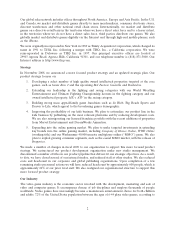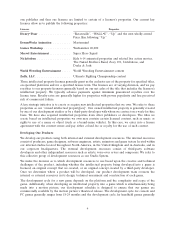THQ 2009 Annual Report Download - page 19
Download and view the complete annual report
Please find page 19 of the 2009 THQ annual report below. You can navigate through the pages in the report by either clicking on the pages listed below, or by using the keyword search tool below to find specific information within the annual report.distribution outside of the United States, the need to refine and tune our products prior to their release,
and the time required to manufacture a game once it is submitted to the manufacturer. We have in the past
experienced development and manufacturing delays for several of our products. Failure to meet
anticipated production schedules may cause a shortfall in our expected sales and profitability and cause
our operating results in any given quarter to be materially different from expectations. Delays that prevent
release of our products during peak selling seasons or in conjunction with specific events, such as the
release of a related movie, could significantly affect the sales of such products and thus our financial
performance.
Video games that are not high quality may not sell according to our forecast, which could materially impact
our profitability in any given quarter.
Consumers who buy games targeted at the mass market and core gamers prefer high-quality games. If our
games are not high quality, consumers may not purchase as many games as we expected, which could
materially impact our revenue and profitability in any given quarter.
Our business is dependent upon the success and availability of the video game platforms on which
consumers play our games.
We derive most of our revenue from the sale of products for play on video game platforms manufactured
by third parties, such as Sony’s PlayStation 2, PlayStation 3 and PSP, Microsoft’s Xbox 360, and Nintendo’s
Wii and DS. The following factors related to such platforms can adversely affect sales of our video games
and our profitability:
Popularity of platforms. In the previous console platform cycle, the PlayStation 2 was the best-selling
platform and games for the PlayStation 2 dominated software sales. In the current platform cycle, the Wii
is the best-selling platform to date, and in 2008, the Wii surpassed the Xbox 360 as the most popular
console in terms of software game sales, according to International Development Group. Since the
development cycle for a console game is from 9 to 24 months, we must make decisions about which games
to develop on which platforms before knowing what the consumer preference for the platforms will be
when the game is finished. Launching a game on a platform that has declined, or failure to launch a game
on a platform that has grown in popularity could negatively alter our revenues and profitability.
Platform pricing. Prices for the current generation of console platforms are higher than for the
respective predecessor platforms. The Xbox 360 can cost as much as $399.99, the Wii is priced at $249.99
and the PS3 can cost as much as $499.99. The cost of the hardware could adversely affect their sales, which
could negatively affect sales of our products for these platforms since consumers need a platform in order
to play our games.
Platform shortages. In the past few years, many of the platforms on which our games are played have
experienced shortages and some, including the Nintendo Wii, are still difficult for consumers to purchase.
Platform shortages generally negatively affect the sales of video games since consumers do not have
consoles on which to play the games.
Our inability to enter into agreements with the manufacturers to develop, publish and distribute titles on
their platforms could seriously impact our operations.
We are dependent on the platform manufacturers (Microsoft, Nintendo and Sony) and our non-exclusive
licenses with them, both for the right to publish titles for their platforms and for the manufacture of our
products for their platforms. Our existing platform licenses require that we obtain approval for the
publication of new games on a title-by-title basis. As a result, the number of titles we are able to publish for
these platforms, and our sales from titles for these platforms, may be limited. Should any manufacturer
choose not to renew or extend our license agreement at the end of its current term, or if any license were
12
























